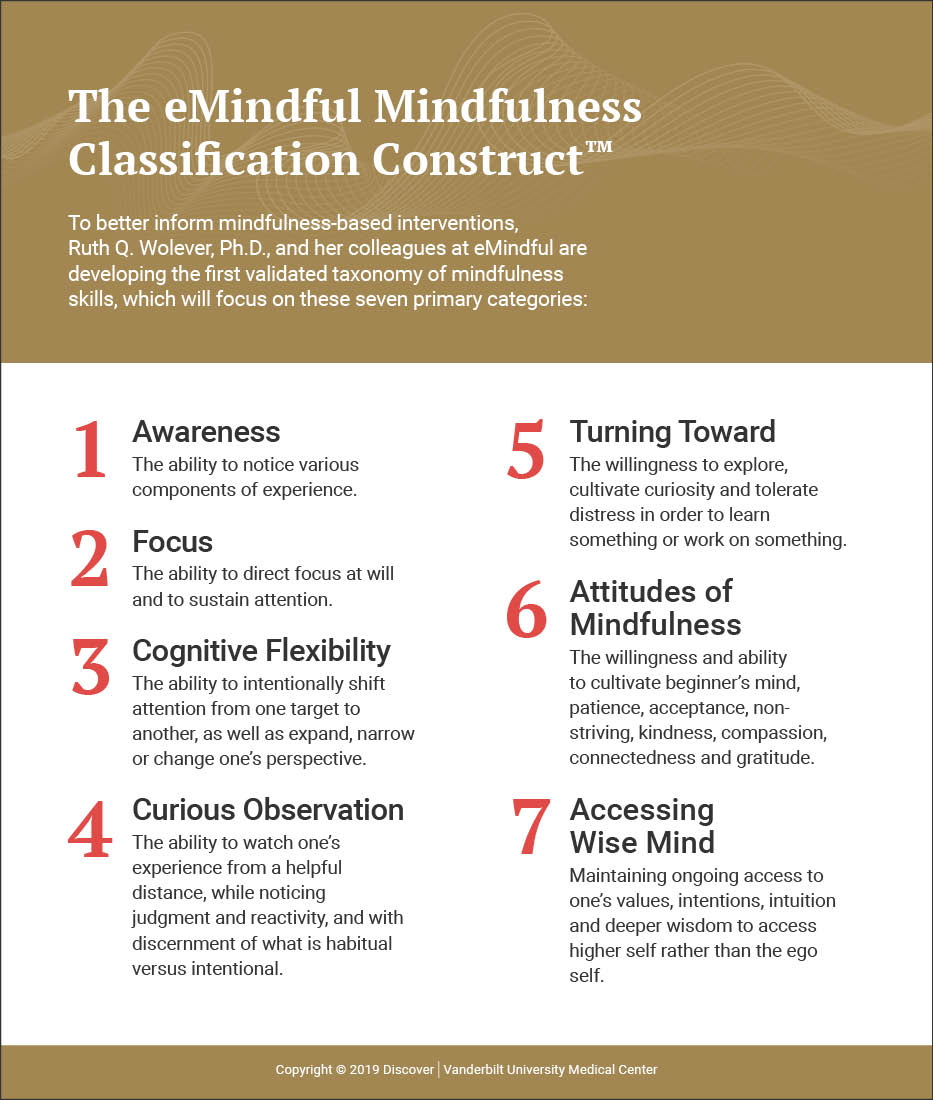When mindfulness researchers Daniel Goleman, Ph.D., and Richard Davidson, Ph.D., sifted through several thousand studies in the field in 2017, only one percent met gold standards for medical research. With mindfulness-based interventions (MBIs) increasingly prevalent in medicine, there remains a dearth of high-quality research to inform their use with specific medical conditions.
Ruth Q. Wolever, Ph.D., a health psychologist at Vanderbilt University Medical Center, is addressing this knowledge gap by developing the first validated taxonomy of mindfulness skills: the eMindful Mindfulness Classification Construct™ (eMCC™). Using this taxonomy, researchers can more confidently match specific MBIs to patients based on characteristics like subpopulation and illness.
“This validated taxonomy will allow clinicians to develop more targeted applications of mindfulness, which will address the skill deficits associated with the targeted condition or illness.”
“This validated taxonomy will allow clinicians to develop more targeted applications of mindfulness, which will address the skill deficits associated with the targeted condition or illness,” Wolever said. “For example, someone who struggles with social anxiety may need to build different mindfulness skills than someone who has major depression or opioid addiction.”
Seven Overarching Skill Categories
Wolever serves as the chief scientific officer at eMindful, a company that disseminates MBIs. In order to support the development of targeted MBIs, Wolever and colleagues at eMindful searched for an empirically sound taxonomy of mindfulness skills. To their surprise, no such taxonomy existed.
After months of collaboration with experienced mindfulness teachers and researchers, Wolever and colleagues initially decided on eight overarching skill categories. These were whittled down to seven validated categories after statistical analyses of feedback from 60 international subject matter experts. The final seven primary categories are Awareness, Focus, Cognitive Flexibility, Curious Observation, Turning Toward, Attitudes of Mindfulness, and Accessing Wise Mind (to be renamed).
Each overarching, or primary, skill also incorporates various secondary skills. Wolever says that although the eMCC™’s main categories have passed initial validation testing, more work is needed to better describe one of the main categories, validate the secondary skill subcategories, and categorize specific practices that train each skill.

Research Enhanced by the eMCC™
The eMCC™ can be used by researchers to match mindfulness skills with specific conditions. For example, Wolever says that with patients struggling to lose weight, “It’s really important to cue in on satiety signals in order to distinguish between emotional and physiological cues to eat.”
Wolever explains this requires understanding to what degree the “cueing” requires the development of Awareness, Focus, Curious Observation, or perhaps some of the Attitudes of Mindfulness.
Patients may also be more motivated by the “precision medicine”- style approach to MBIs. The hope is that focusing on the most relevant mindfulness skills will contribute to more dramatic results, leading to a greater desire to engage with treatment, and hence more adherence – a positive feedback loop.




